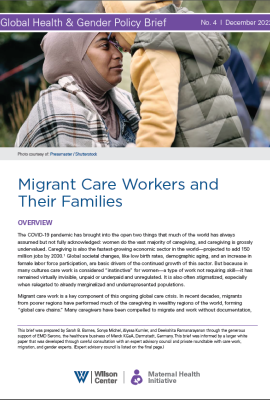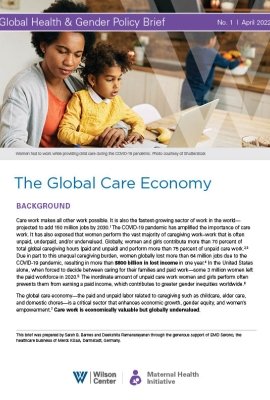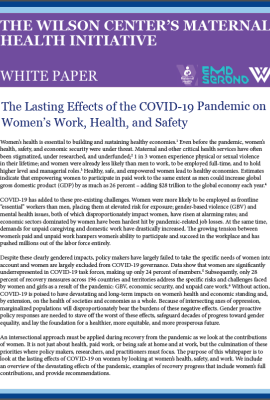Women and Care Work
Since 2017, the Wilson Center's Maternal Health Initiative - in partnership with EMD Serono, the healthcare business of Merck KGaA, Darmstadt, Germany - have highlighted the gendered burden of caregiving work through blog articles, public dialogues, and publications.
Advisory Group Members

Sonya Michel, PhD
Former Director of United States Studies and Senior Scholar, Wilson Center;
Professor Emerita, History and Women's and Gender Studies, University of Maryland
Professor Emerita, History and Women's and Gender Studies, University of Maryland

Helma Lutz, PhD
Former Wilson Center Fellow (2012-2013);
Professor Emerita, Women's and Gender Studies in Sociology, Goethe University, Frankfurt, Germany
Professor Emerita, Women's and Gender Studies in Sociology, Goethe University, Frankfurt, Germany

Eileen Boris, PhD
Former Wilson Center Fellow (1988-1989);
Hull Chair and Distinguished Professor, Feminist Studies and History, University of California, Santa Barbara
Hull Chair and Distinguished Professor, Feminist Studies and History, University of California, Santa Barbara

Ito Peng
Public Policy Fellow;
Professor, Sociology and Canada Research Chair in Global Social Policy, University of Toronto
Professor, Sociology and Canada Research Chair in Global Social Policy, University of Toronto

Barbara Hobson, PhD
Professor Emerita, Sociology, Stockholm University, Sweden
Explore more related to this collection
43
results

Maternal Health Initiative
Housed within the Wilson Center's Environmental Change and Security Program, the Maternal Health Initiative (MHI) leads the Wilson Center’s work on maternal health, global health equity, and gender equality. Read more










